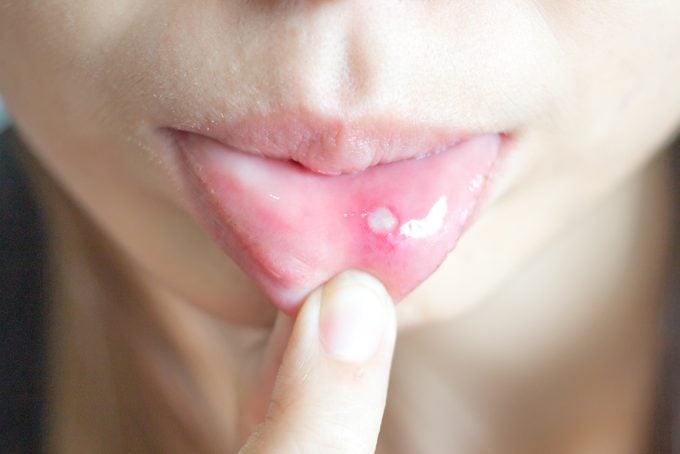This Is When Your Canker Sore Is Something More Serious
Updated: Mar. 25, 2022
Part of the key is how long you have the sore.

It’s lunchtime, and you take a nice big bite of your sandwich only to feel a familiar sting-like mouth pain. Of course, you inspect the inside of your mouth to find the culprit—a canker sore. Although they’re annoying, most people just ignore these small sores, lesions, or mouth ulcers—but they could be a sign of something more serious.
What is a canker sore?
A canker sore is a small lesion with a yellowish center and surrounding redness usually found on your tongue, lips, or the inside of your cheeks. Many may appear at the same time, but they typically only last seven to 14 days in healthy people, according to Omid Mehdizadeh, MD, an otolaryngologist and laryngologist at Providence Saint John’s Health Center in Santa Monica, California. They could show up a couple of times a year with multiple sores at a time, especially in people between ten and 20 years old, per the Cleveland Clinic. There’s no definitive answer for what causes canker sores. Anything from stress or a minor injury to inflammation or sharp teeth could be to blame. Even hormonal changes, harsh mouthwashes, and spicy foods might cause these sores. Your mouth and tongue also signal vitamin deficiencies and these 9 other surprising health secrets.
There are two main types of canker sores: minor or simple sores and major or complex sores. Simple canker sores are relatively small, last up to two weeks, and are the most common type of canker sore, and you can use these simple canker sore remedies to heal them. There’s no need to worry about these. Major canker sores are less common, more painful, larger, and deeper. Plus, they take four to six weeks to go away and sometimes leave scarring, Dr. Mehdizadeh says. These can be extra irritating, so you might want to consult your doctor if you think you’re dealing with the complex variety.
When are canker sores something to worry about?
Since canker sores are painful, they might keep people from taking in enough water or nutrients from food, impacting your health, Dr. Mehdizadeh says. Besides nutrition, there are a few things to watch out for that might mean your canker sore is actually a sign of something more serious going on with your health, according to Dr. Mehdizadeh. Any sores that grow, bleed, firm up, or simply don’t go away after a few weeks should be checked and tested by a doctor since mouth ulcers appear in people with autoimmune conditions, inflammatory bowel diseases, and people who have B-12, zinc, folic acid, or iron vitamin deficiencies, per the Cleveland Clinic.
If you also have added symptoms like unintentional weight loss, ear pain, fever, chills, and night sweats, these may be signs of oral cavity cancer, according to Dr. Mehdizadeh. Note that canker sores don’t “become” cancerous, but a cancerous lesion may appear as or mimic a canker sore. That’s why you should consult your doctor if you have a sore as well as these symptoms or any of these 13 other silent signs of oral cancer.
